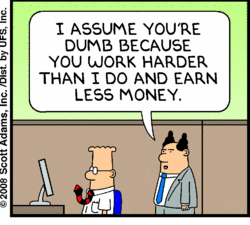Last week, I wrote an open letter to people from the business world telling them to stop thinking they are better than us nonprofit folks. That resonated with a lot of people from our sector: “Yeah, business people, just because you have decent dental insurance and can go to Chipotle as often as you like does not mean you’re better than us!”
But today, we need to address an equally serious problem with our sector, and that is our own sense of inferiority, which, unlike the overt superiority of many of our friends from the corporate sector, is usually unconscious. Still, it is pervasive across the sector, and combined with the martyr complex, it is debilitating. These things lead to burn out and prevent people from wanting to enter our field.





 All right everyone, I hope you are all sitting down for this, because I am filled with mild outrage at the National Football League. But first, go Seahawks! Dudes, sweet touchdown at the last minute to beat the Panthers! We all needed that. We’ve been worried about you guys. Welcome back!
All right everyone, I hope you are all sitting down for this, because I am filled with mild outrage at the National Football League. But first, go Seahawks! Dudes, sweet touchdown at the last minute to beat the Panthers! We all needed that. We’ve been worried about you guys. Welcome back!